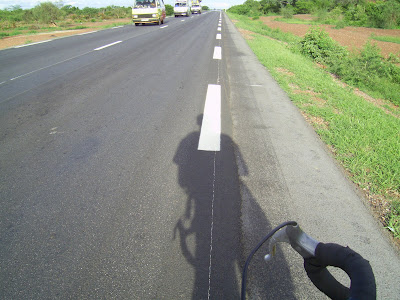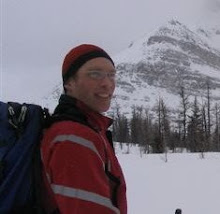Just before leaving Niamey, a man that I met there gave me the contact details for someone in the next big town, Dosso. I told him that I probably wouldn't stop in Dosso, since I prefer smaller towns or villages, but would take the details just in case. Well, it turns out that I was very late leaving Niamey (9:30am instead of 6:30!) so Dosso wound up being a very good place to stop.
When I contacte

d this friend of a friend, he turned out to be a young (30), single man who works as an accountant for PLAN Int'l, a big NGO here. I introduced myself and he immediately invited me to stay the night with him. Incredible. He took me to his clean, but humble appartment and made me feel right at home. While I was having a shower, he ran out and bought a big carton of juice (real fruit juice imported from France) and a bottle of Olives to have as a snack before dinner. Zacharie was just really excited to have me, and tried his hardest to spoil me despite my protests that it was really unnceccessary. We had some great chats about development work in Africa and spent some time praying for one another. It was a real enjoyable evening, and the next morning, I felt like I was saying goodbye to an old friend.
The next evening, when evening started to arrive, I was just coming up to a large town again. I didn't have contact details here, and it's also not like a village where you can just sit down and ask to talk to the important people about a place to stay. I decided to ask a young man who could speak French where I might find the local church. He said he didn't know, but pointed me in the direction of 2 men seated a stone's throw away, saying that I should ask them because they are Christians. I walked over and again asked where I could find a church in town. One of the men answered that he was a Pastor and the other said - "Hey! I know you. You were in our church in Niamey last Sunday!" The Pastor instantly invited me home and helped me by finding a professional repair man to work on my punctured tube.
His house is on the same property as the church and they had a Bible Study that night so I went to join them. It was short, but lively and all in the Hausa language. I didn't understand a thing, but enjoyed being a part of a group of Christians who were authentically seeking to know more about their God. I was now squarely in Hausa territory and will continue to be, all across the rest of Niger and Nigeria and into Cameroon. After returning from the church, I ate with the Pastor's family and then he asked me a question that I have not been asked before... "Do you prefer sleeping indoors or outdoors?" Definitely outdoors! "Great!" he said, then proceeded to set up a system whereby he could hang my mosquito net. Then he brought out a mattress for me and I slept up on the porch, in a nice cool breeze all night - Absolutely SUPERB!
When I arrived in Madawa, another large town (decided that they were my best bet now, in order to find French speakers), I thought I would try something different. I went to the office of MSF (Doctors Without Borders) and asked if they might have a place to stay. The important people were in a meeting so I sat and chatted with the guards, and various other personel. We had some great laughs and a good time chating about bicycles and traveling while we waited about an hour and a half for the meeting to finish. One of the guys told me "Look- here's my number. If they can't give you a place to stay here, you are welcome to stay with me at my house on the other side of town." Sure enough, MSF didn't have a room for me, so I called up their employee who gave me directions to his house. It turns out that he is the mechanic for MSF and comes from one of the towns in Niger that I have already passed through.
Adamou is a muslim man, and very devout. He had been fasting all day so in the evening, as soon as it was dark, and the prayers were over, we had a real feast! There were at least " different kinds of drinks that we had, and I think there were ' types of dishes that we ate. The piece de resistance, however, was a giant bowl of freshly made cole-slaw. Made with local cabbage and real mayonaise. Incredible. Just outside Adamou's house was a prayer area, where they had set up their mats facing East. When the mosque speakers were calling out the prayers, all the men from the street walked over, took their shoes off and went in. It was really interesting to watch as they used various postures of prayer (standing, arms outstretched, bent over, kneeling upright, kneeling forhead to the ground, etc). The women came to pray as well, and laid their mats down on the ground behind the men's shelter.
I really admire their dedication and desire to please their God. It is serious business for them and I wonder how much of the Arabic calls they understand. I wonder what would happen if Christians took 15 minutes, 5 times a day to call on God and seek to understand and submit to his will? This has been challenging for me to think about. Too often my prayers do not occupy a place of importance in my life - they happen as I am driving, riding, or briefly before eating, etc. Although it is true that I have a God who is accessible at any time, I am starting to re-evaluate how much respect and honour I give him.
A really intersting site to check out is: 30days.net - it has lots of good information and a guide about how to pray for the people who are seeking Peace over the month of Ramadan.






















































